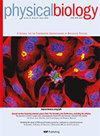Rapid prediction of lab-grown tissue properties using deep learning
IF 1.6
4区 生物学
Q4 BIOCHEMISTRY & MOLECULAR BIOLOGY
引用次数: 0
Abstract
The interactions between cells and the extracellular matrix are vital for the self-organisation of tissues. In this paper we present proof-of-concept to use machine learning tools to predict the role of this mechanobiology in the self-organisation of cell-laden hydrogels grown in tethered moulds. We develop a process for the automated generation of mould designs with and without key symmetries. We create a large training set with $N=6400$ cases by running detailed biophysical simulations of cell-matrix interactions using the contractile network dipole orientation (CONDOR) model for the self-organisation of cellular hydrogels within these moulds. These are used to train an implementation of the \texttt{pix2pix} deep learning model, with an additional $100$ cases that were unseen in the training of the neural network for review and testing of the trained model. Comparison between the predictions of the machine learning technique and the reserved predictions from the biophysical algorithm show that the machine learning algorithm makes excellent predictions. The machine learning algorithm is significantly faster than the biophysical method, opening the possibility of very high throughput rational design of moulds for pharmaceutical testing, regenerative medicine and fundamental studies of biology. Future extensions for scaffolds and 3D bioprinting will open additional applications.利用深度学习快速预测实验室培养的组织特性
细胞与细胞外基质之间的相互作用对组织的自组织至关重要。在本文中,我们提出了使用机器学习工具来预测这种机械生物学在系留霉菌中生长的载细胞水凝胶的自组织中的作用的概念验证。我们开发了一个过程,自动生成模具设计与不关键的对称性。我们使用可收缩网络偶极取向(CONDOR)模型对这些模具内细胞水凝胶的自组织进行细胞-基质相互作用的详细生物物理模拟,从而创建了一个包含$N=6400$案例的大型训练集。这些用于训练\texttt{pix2pix}深度学习模型的实现,以及神经网络训练中未见的额外$100$案例,用于审查和测试训练后的模型。将机器学习技术的预测结果与生物物理算法的保留预测结果进行比较,表明机器学习算法的预测效果非常好。机器学习算法比生物物理方法快得多,为药物测试、再生医学和生物学基础研究提供了非常高通量的模具合理设计的可能性。未来对支架和3D生物打印的扩展将开辟更多的应用。
本文章由计算机程序翻译,如有差异,请以英文原文为准。
求助全文
约1分钟内获得全文
求助全文
来源期刊

Physical biology
生物-生物物理
CiteScore
4.20
自引率
0.00%
发文量
50
审稿时长
3 months
期刊介绍:
Physical Biology publishes articles in the broad interdisciplinary field bridging biology with the physical sciences and engineering. This journal focuses on research in which quantitative approaches – experimental, theoretical and modeling – lead to new insights into biological systems at all scales of space and time, and all levels of organizational complexity.
Physical Biology accepts contributions from a wide range of biological sub-fields, including topics such as:
molecular biophysics, including single molecule studies, protein-protein and protein-DNA interactions
subcellular structures, organelle dynamics, membranes, protein assemblies, chromosome structure
intracellular processes, e.g. cytoskeleton dynamics, cellular transport, cell division
systems biology, e.g. signaling, gene regulation and metabolic networks
cells and their microenvironment, e.g. cell mechanics and motility, chemotaxis, extracellular matrix, biofilms
cell-material interactions, e.g. biointerfaces, electrical stimulation and sensing, endocytosis
cell-cell interactions, cell aggregates, organoids, tissues and organs
developmental dynamics, including pattern formation and morphogenesis
physical and evolutionary aspects of disease, e.g. cancer progression, amyloid formation
neuronal systems, including information processing by networks, memory and learning
population dynamics, ecology, and evolution
collective action and emergence of collective phenomena.
 求助内容:
求助内容: 应助结果提醒方式:
应助结果提醒方式:


